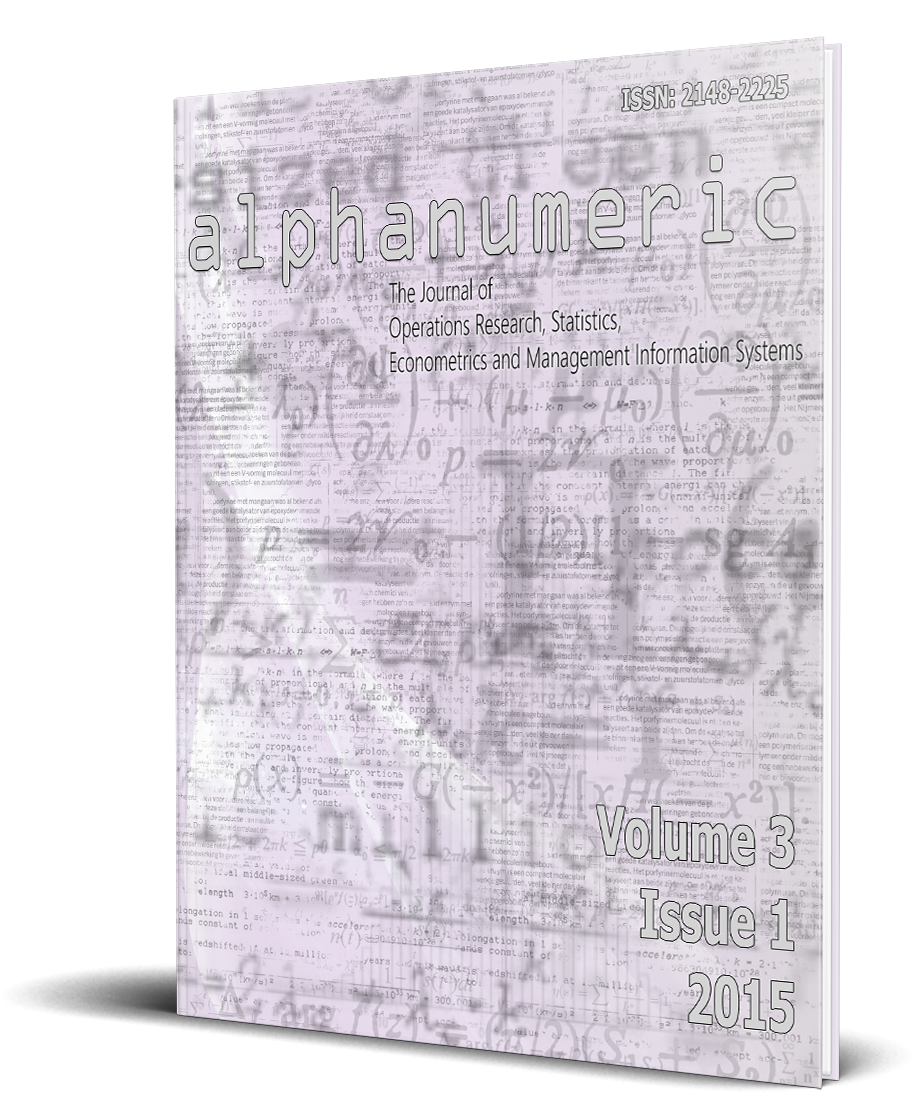
alphanumeric journal
The Journal of Operations Research, Statistics, Econometrics and Management Information Systems
Measuring the Relative Efficiencies of Statistics Departments in Turkey Using Data Envelopment Analysis
Abstract
Determinants of success of an education system can be the facilities offered during an educational process and the qualifications obtained afterwards. However, conversion of the offered facilities into outputs efficiently in the performance evaluation plays an important role for an educational system. On the contrary, comparison of Turkish university performances can be generally performed according to only output based performance indicators like academician performances and nationwide exam results of their graduates publicly. Aim of this study is to calculate the relative efficiencies of 18 statistics departments in Turkey, which are considered as decision making units, using data envelopment analysis. Reasons for inefficiencies of departments arise from pure technical efficiency component. Furthermore, a second stage analysis is implemented to observe the effects of external factors called non-discretionary inputs on efficiency results. Finally, efficiency differences between two types of departments are tested according to their education programs with a Mann - Whiney U Test.
Keywords: Data Envelopment Analysis, Higher Education, Relative Efficiency, Second Stage Analysis
Jel Classification: C44, I21, I23
Türkiye'deki İstatistik Bölümlerinin Göreli Etkinliklerinin Veri Zarflama Analizi ile Ölçülmesi
Öz
Bir eğitim sisteminin başarısındaki belirleyici faktörler: eğitim süreci içinde sunulan olanaklar ve eğitim süreci sonrası elde edilen yeterlilikler olabilmektedir. Bununla birlikte, eğitim sistemlerinin performanslarının değerlendirilmesinde sunulan olanakların çıktılara etkin bir şekilde dönüştürülmesi önemli bir rol oynamaktadır. Buna karşılık olarak Türkiye’deki üniversite performanslarının karşılaştırılmaları genellikle akademisyen performansları ve ülke genelinde yapılan ortak sınav sonuçları gibi performans belirleyicileri üzerinden sadece çıktı yönlü olarak yapıldığı gözlemlenmektedir. Bu çalışmanın amacı karar verme birimi olarak ele alınan Türkiye’deki üniversitelerde eğitim veren 18 adet istatistik bölümünün göreli etkinliklerinin veri zarflama analizi yardımı ile hesaplanmasıdır. Bölümlerin toplam etkin olamamaları teknik etkinsizliklerinden kaynaklandığı sonucuna ulaşılmıştır. Ayrıca, kontrol edilemeyen girdiler olarak adlandırılan dış etkenlerin etkinlik skorları üzerindeki etkileri bir ikinci aşama analizi kullanılarak araştırılmıştır. Son olarak ise iki farklı tipte eğitim veren istatistik bölümlerinin etkinlik skorları arasındaki farkın istatistiksel anlamlılığı Mann-Whitney U testi ile sınanmıştır.
Anahtar Kelimeler: Göreli Etkinlik, Veri Zarflama Analizi, Yüksek Eğitim, İkinci Aşama Analizleri
Suggested citation
(). Measuring the Relative Efficiencies of Statistics Departments in Turkey Using Data Envelopment Analysis. Alphanumeric Journal, 3(1), 41-50. http://dx.doi.org/10.17093/aj.2015.3.1.5000105942
References
- Doucouliagos C, Abbott M, (2003) The efficiency of Australian universities: a data envelopment analysis. Economics of Education Review. 22:89-97.
- Charnes A, Banker RD, Cooper WW (1984) Some Models for Estimating Technical and Scale Inefficiencies in Data Envelopment Analysis. Management Science. 30(9):1078-1092.
- Barros CP, Leach S (2006) Performance Evaluation of the English Premier Football League with Data Envelopment Analysis .Applied Economics. 38:1449-1458.
- Otto L, Bogetoft P (2011) Benchmarking with DEA, SFA and R. Springer.
- Charnes A, Rhodes E, Cooper WW (1978). Measuring the efficiency of decision making units. European Journal of Operational Researc, 2(6): 429-444.
- Seiford LM, Cook WD, Cooper WW (2009). Data Envelopment Analysis (DEA) - Thirty Years on . European Journal of Operation Research. 192:1-17.
- Seiford LM, Tone K (2000). Data Envelopment Analysis: A Comprehensive text with Models, Applications, References and DEA- Solver Software . Kluwer Academic Publishers.
- Suner A, Çelikoğlu CC (2013). Türkiye'deki İstatistik Bölümlerine İlişkin İstatistikler. n'den N'ye Gezinti İstatistik Dergisi, 38-45.
- Farrell M (1957). The Measurement of Productive Efficiency. Journal of the Royal Statistician Society. 120(3): 253-290.
- Sezen B, Gök MŞ (2011). Analyzing the Efficiencies of Hospitals in Turkey: An Application of DEA. Journal of Global Strategic Management. 5(2): 137-146.
- Johnes J (2006). Data envelopment analysis and its application to the measurement of efficiency in higher education. Economics of Education Review, 25, 273-288.
- Kağnıcığıoğlu HC, İcan Ö. (2011). Measuring Relative Efficiencies of Turkish Universities in 2007: A DEA Case Study in R. Anadolu University Journal of Social Sciences. 11(1): 13-26.
- Kempkes, G., & Pohl, C. (2010). The efficiency of German universities- some evidence from non-parametric and parametric methods. Applied Economics, 42, 2063-2079.
- Kıranoğlu ME (2005). Measuring Secondary School Education Efficiencies of Turkish Provinces: An Application of Data Envelopment Analysis. T.C.Marmara University Institute For Graduate Studies In Pure And Applied Siıences : Thesis For The Degree Of Master Of Science In Industrial Engineering Programme.
- Gulati R, Kumar S (2008). An Examination of Technical, Pure Technical, and Scale Efficiencies in Indian Public Sector Banks using Data Envelopment Analysis. Eurasian Journal of Business and Economics, 1(2): 33-69.
- McDonald J (2009). Using least squares and tobit in second stage DEA effciency analyses. European Journal of Operational Research. 197: 792-798.
- Ramanathan R (2003). An Introduction to Data Envelopment Analysis. Sage Publications.
- Selim S, Bursalioğlu SA (2013). Analysis of the Determinants of Universities Efficiency in Turkey:Application of the Data Envelopment Analysis and Panel Tobit Model. Procedia - Social and Behavioral Sciences 895-900.
- Wöber KW (2007). Data Envelopment Analysis. Journal of Travel & Tourism Marketing. 21(4): 91-108.
2015.03.01.OR.03
alphanumeric journal
Pages 41-50
Received: March 13, 2015
Accepted: June 23, 2015
Published: June 30, 2015
2015 İçöz, C., Sönmez, H.
This is an Open Access article, licensed under Creative Commons Attribution-NonCommercial 4.0 International License.

scan QR code to access this article from your mobile device
Contact Us
Faculty of Transportation and Logistics, Istanbul University
Beyazit
Campus 34452 Fatih/Istanbul/Türkiye
Bahadır Fatih Yıldırım, Ph.D.
editor@alphanumericjournal.com
+ 90
(212) 440 00 00 - 13219
alphanumeric journal
alphanumeric journal has been publishing as "International Peer-Reviewed Journal" every six months since 2013. alphanumeric serves as a vehicle for researchers and practitioners in the field of quantitative methods, and is enabling a process of sharing in all fields related to the operations research, statistics, econometrics and management informations systems in order to enhance the quality on a globe scale.

